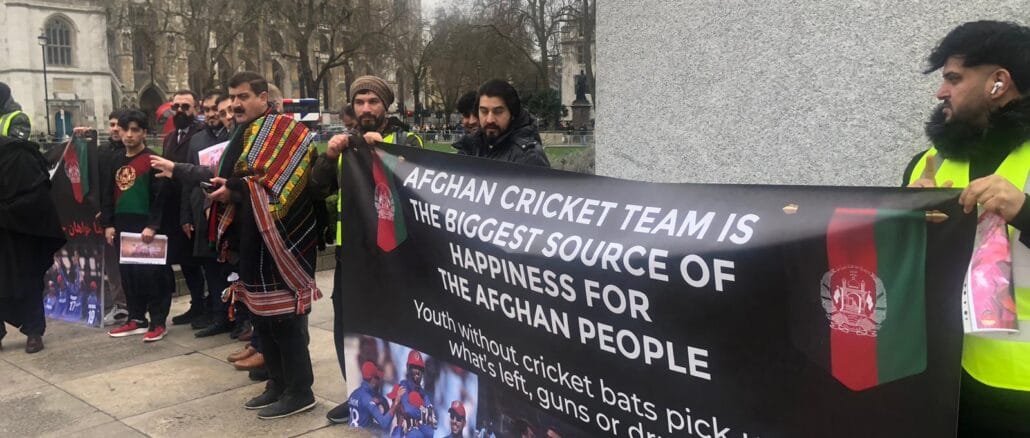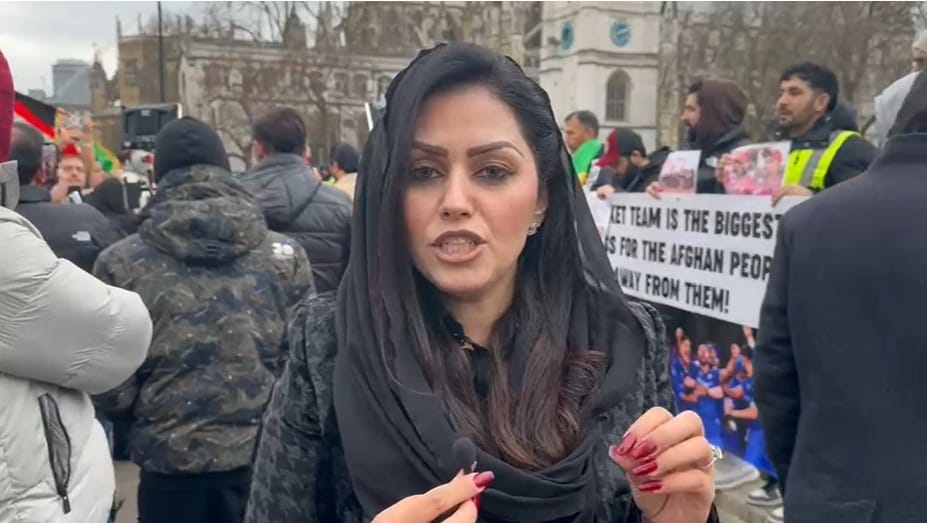
Dozens of Afghans gathered outside the British Parliament on Thursday, January 16, to protest calls for a boycott of Afghanistan’s men’s cricket team. Holding signs declaring cricket as the Afghan people’s only source of joy, the protesters argued that penalizing the team would not help end the Taliban’s growing restrictions on women.
This demonstration follows a letter signed by 160 members of the British Parliament, urging the England and Wales Cricket Board (ECB) to refuse to play Afghanistan in the upcoming Champions Trophy. The South African Minister of Sport echoed this stance, instructing his country’s cricket board to avoid facing Afghanistan.

Protesters insisted that banning the men’s team would do little to reduce hardships for women. Instead, they warned, it would create additional challenges for young Afghan men who have built their lives around cricket. One protester, Dewa Patang, stated that “banning one thing because of another ban doesn’t solve anything,” adding that international leaders wishing to help Afghan women should “find more practical ways” to bring about change.
While opposing any worldwide boycott of Afghan cricket, demonstrators also called for reopening schools for girls and demanded broader rights for Afghan women. Patang noted that if British lawmakers ban cricket while the Taliban ban education for women, “there is no real difference” between the two.
Another protester, Qamarzaman Jabar Khil, emphasized that curtailing Afghan cricket will not resolve the country’s issues. “We will not allow anyone to undermine our values or create new problems,” he said. “If we have gathered here in front of the British Parliament today, we are prepared to take more steps to block their harmful agendas.”
With the Champions Trophy looming, the Afghan national cricket team, including star player Rashid Khan, is under increasing scrutiny. In response to the Taliban’s mounting restrictions on women, Human Rights Watch (HRW) recently called on the International Cricket Council (ICC) to suspend Afghanistan’s membership until women’s rights, including the right to play sports and to work, are upheld.
According to a Radio Azadi report, Heather Barr, Associate Director of the Women’s Rights Division at HRW, urged the ICC to “suspend Afghanistan’s membership and participation in international competitions until Afghan women and girls regain their rights.” When asked whether barring Afghanistan’s team from ICC matches would be effective, Barr refrained from commenting directly on the practicality of such a move, underscoring instead the priority of securing women’s broader participation in society.
Despite concerns that the campaign against Afghan cricket could gain momentum, neither England nor South Africa’s cricket boards have heeded their politicians’ calls to boycott Afghanistan. The ICC has also described Afghanistan’s upcoming participation in the Champions Trophy as “historic.”
The Champions Trophy, which will begin on February 19 in Pakistan and the United Arab Emirates, will feature eight teams. Afghanistan is scheduled for group-stage matches against Australia, South Africa, and England.



1 Trackback / Pingback